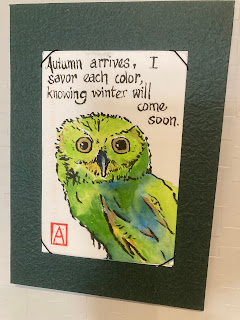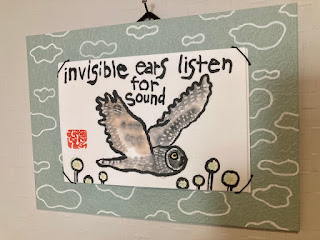Fumiko Koga, Saga prefecture JP
(translation: No, I'm not angry. I'm just watching out for you.)
Robin Scanlon, state of Hawaii US
(自由に飛べ)
Hideko Sonomura, Fukui prefecture JP
(translation: Half a century of synchronicity between us)
Alice Webb, state of Arizona US
(冬がこのすぐ先にあると認識して、秋の色をひとつ一つしっかり味わう)
Jackie Bufton, Torquay UK
(梟は見て聞くが、見て聞いたことは決して漏らさない)
Marita McVeigh, state of Pennsylvania US
(環境汚染問題に関心を持とう)
Hideko Sonomura, Fukui prefecture JP
(translation: Though we are now late-stage seniors, let's continue to be close, have fun, and watch out for one another.)
Betsy Harting, state of Delaware US
(夜更かしフクロウ)
dosankodebbie, Hokkaido prefecture JP
(木兎は不断日永と思ふ哉 小林一茶)
Lisa Jastram, state of Texas US
(あなたの観点から物事を見ようとしています)
Jayne Heetderks, state of New York US
(足はダンスのためにあるもの。そーれキック!)
Paula Reeves state of Iowa US (輝き続けろ 秋の月よ)
dosankodebbie, Hokkaido prefecture JP
("Silver droplets falling falling..." first line of the the Ainu folktale known as The song sung by the owl god")
Owls in Japanese Culture
In Japan owls are often seen as bringers of luck and protection from suffering. The reason for this is a form of wordplay. The sound of the word for "owl" (written 梟 and pronounced fu-ku-rou) can mean "bringer-of-luck" or "no hardships" depending on which characters having the same sound are substituted for 梟. Thus, owl ornaments and owl charms make popular gifts. Furthermore, the Ainu (indigenous people of northern Japan) honor the magnificent (and currently listed as endangered) Blakiston's Fish Owl as the guardian of the human village. Owls feature frequently in Japanese and Ainu art and literature.














































No comments:
Post a Comment